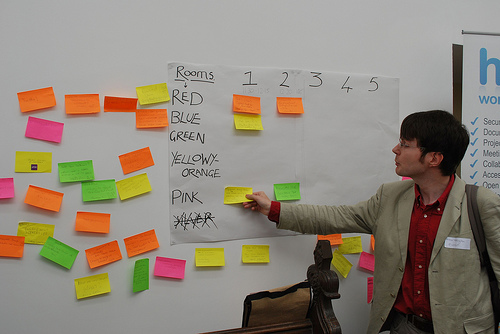With the excitement building up to LocalGovCamp Yorkshire and the Humber on Saturday, I thought I might share this piece, which I wrote for the UKGovCamp hub site a little while ago.
It’s a ten point plan to organising your own GovCamp type event – and it really is quite easy!
1. Have an idea
It doesn’t really even need to be a good one, though that sometimes helps. GovCamps take two main forms: being about a location, or an issue. So, would gathering people to talk about lots of issues about a specific place be useful? Or maybe getting people from lots of different places to talk about one similar topic would work better.
2. Float your idea
Join the Nou Camps group on UKGovCamp, and just chuck your idea out there. Mention it on Twitter, on your blog if you have one, and other online networks. How do people react? If they don’t at all, then it’s probably a non-starter. If they do, but don’t offer to help organise, then it’s worth doing, but expect to be busy!
3. Create a group
Next, if people seem interested, create a group on UKGovCamp and invite people to join it. Ask people for ideas on venues, sponsors, things to talk about and that sort of thing. Also ask for volunteers, but don’t be upset or indeed deterred if there aren’t many. Often it’s easier to get things done yourself.
4. Decide on a date, and find a venue.
First of all: weekday or weekend? All depends on your audience. If it’s a very worky-type event, do it on a weekday. If it’s a bit more socially-inclined, then a weekend is perfect. Here’s an example – Jon’s localgovcamp about project management was planned for a Saturday, but not many people fancied it. He changed it to a weekday, and was oversubscribed!
Next, fix a date. Don’t ask loads of people because a) they’ll give you a different response; and b) you’re giving them an excuse not to come if you don’t choose their preferred date. Instead, pick a couple of weeks where it could happen, and then…
Get a venue. What does it need? One big room for congregating in. Several breakout rooms – the numbers depend on how many attendees you have. Lots of coffee is a must! Wifi is also quite important, but not a deal breaker.
If you can, get someone to let you have the venue for free – it’s your biggest cost by a mile if you can’t. Approach companies in the area you want to host it in to see if they’ll put you up – they often will if it is a weekend and they get some good press out of it.
The venue will generally detemined the exact day you run your GovCamp on.
5. Organise, and find someone to pay for, the food and drink
Having a decent venue is important, but having decent – and sufficient – food and drink is vital. Arrange to have very regular deliveries of tea and coffee, and make sure that pastries, biscuits, muffins and that sort of thing are turning up all the time too. If you can arrange for a sponsor to bring a supermarket trolley full of Mars bars, apple pies and cans of coke, all the better!
Lunch is important too. Always order more than you need – never underestimate the appetites of public servants out on a junket.
6. A note on sponsors
I have mentioned sponsors – or at least, getting people to pay for stuff – a couple of times now. Here’s my advice on this – identify things that need paying for, and then get someone to pay for it. Don’t whatever you do either pay yourself, then find a sponsor to pay you back, or just take cash from a sponsor. Connect the sponsor to the supplier, and let them get on with it. Two reasons for this: you’ve got other things to be thinking and stressing about, and if you’re anything like me, you’ll probably cock it up.
7. Pimp your ‘camp
Keep banging on about your event, on Twitter, blogs, forums, social networks, phone calls, emails, conversations with strangers. It’s a good idea to set up a site for your GovCamp so people have an easy place to link to – a simple WordPress blog will do.
Use something like Eventbrite to handle ticketing, it makes life a lot easier. Release tickets in batches to create a false sense of excitement. Always hold a few back for good people you’d like to attend but who weren’t quick enough originally.
Think of some mad stuff to do at your GovCamp. If you fancy having some musical accompaniment – why not get a DJ to come along? It’ll be fun! Tell everyone about it – they’ll think you’re an idiot, but it turns out that everyone LOVES idiots.
Basically though, never, ever, stop talking about your event.
8. Get some tat to give away
The thing with sponsors and GovCamps is that there isn’t that much to pay for. Once the venue is sorted, and the lunch and refreshments, that’s all the important stuff done. So you’re likely to have to invent things you ‘need’ to satisfy the need of companies to be seen to be involved with your awesome event. So, get people to pay for things like:
- T-shirts
- Pens
- Mugs
- USB sticks
- Stickers
- Badges
- …and anything else you can think of
9. Get people ready to present
The one big worry about a GovCamp is that nobody is going to want to talk about anything. Usually you’re safe because there will be one or two happy campers who know the drill. To be sure though, get people to talk about issues they’d like discussed before the event, online. Encourage people to join together to present sessions together if they have similar interests. Talk to people offline to make sure they will be up for stepping forward to suggest something they’d like to talk about.
As a back-up, have a couple of your ideas up your sleeve yourself – you almost certainly won’t need them, but just in case…
10. Get the agenda sorted – and then relax
The last stressy thing to get done is first thing, on the day – and that’s the agenda. Find someone skilled with a magic marker and get them to draw a grid on a sheet or two of flipchart paper. Then, gather everyone around and get them to introduce themselves – a good way is for everybody to say their name, organisation and then two or three words that describe why they are there.
Next, call people forward to suggest sessions. In a break from true Barcamp style tradition, it’s often useful to get people to tell the group what they are planning on talking about, so everyone gets an idea of what is on the agenda. They then write them down on a post it, and add it to the agenda grid.
Once this process has begun, you’re done. Relax in the marvellousness you have created.

 This Saturday sees the latest
This Saturday sees the latest 